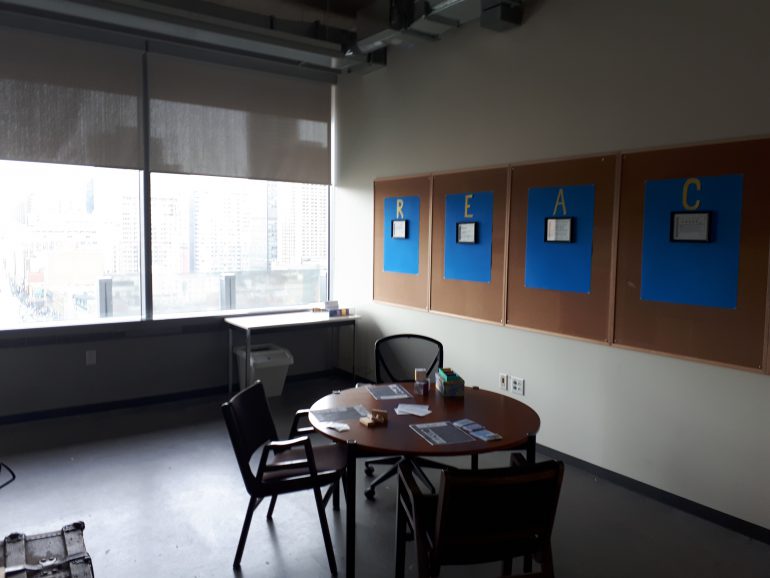With the support of TAG, I was able to create and play test the first iteration of my analog escape game, Reactile. The major component of my Masters research creation project, the game explored three central themes; intergenerational space, serious games, and media literacy. As I enter into the writing portion of my Masters, I am reflecting on how these three themes expressed themselves through the creative process.
A primary challenge for the project was defining, and theorizing an intergenerational space. I recognized that games could be used to encourage collaborative play, wanting to encourage players of all ages to participate simultaneously and equally in the game. In designing the game, the line between ageist stereotypes, representative environmental pieces and puzzles, and knowledge affordances of each player. I wanted my players to feel comfortable and properly represented in the game environment, avoiding large homogenization, however it quickly became impossible to assume my players would have any relation to the presented material. Intergenerational design transformed into explorations of approachable design, where players felt welcomed into the game experience, and the game mechanics did not require large amounts of pre-existing knowledge.
Relationships between player knowledge and game content was critical in the design process. One of my objectives was to use the game to discuss digital issues such as personalization, content filtering, and online echo chambers. Recognizing the interplay between computers and games, an analog format allowed participants with limited technical knowledge or skills to engage with the material. I relied on metaphor and analogy within the tasks, puzzles and environmental design to start conversation with players. Educational content was abstracted, embedded implicitly into the game, where the necessity of a post-game debrief was critical for knowledge extraction. Through the playtests, I reflected on the debrief section, applying different teaching methodologies to its structure. The ‘seriousness’ of the game, became tied with explorations of performative play, and subversive and inquiry-based teaching methodologies.

Image of Reactile before first playtest.
The final, and educational theme was the project’s focus on media literacy. In the design process, I immersed myself in literature, lectures, and conducted interviews with scholars that studied my games themes (Personalization, Filter bubbles, Echo Chambers). My own understanding of these ‘digital issues’ was stretched, specifically the two concepts of filter bubbles and echo chambers. Current discourse is challenging the often taken for granted nature of echo chambers and filter bubbles, critiquing them as media scare tactics or mis-understood algorithmic processes. This new idea caused me to alter the project’s content, transitioning the presentations of filter bubbles and echo chambers, to discussions of content filtering, and questions of trust. Trust became a central theme of the project, where trust in content, and platforms guide our daily practices.
These are the basic themes emerged in the design and implementation of the project, where playtesting allowed for further speculation of next steps for the project. As I move into the academic writing connected to the project, and update the game for potential implementation again, I am going to continually reflect on the material. Since this was my first time doing a creative research project, it has been a great experience to explore research creation as a methodology, and I could not have done it without the support of TAG and its members.
If you want to learn more about this project’s findings alongside my writing I occasionally post updates on my blog (stratagem.blog).
